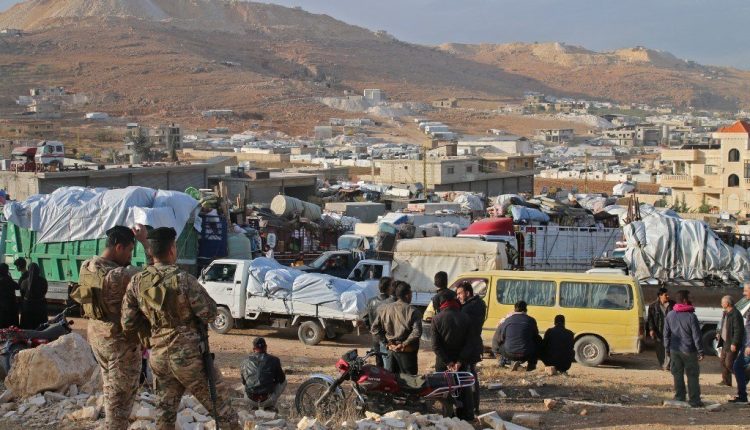Lebanon Resumes Forced Deportations of Syrian Refugees After Hiatus
By Kardo Roj
DAMASCUS, Syria (North Press) – Lebanese authorities resumed the forced deportation of Syrian refugees on Friday from the northeastern town of Arsal, marking the first such operation since before the collapse of the previous Syrian government, and despite ongoing international concerns about the safety of returnees.
According to reports from Lebanese media outlets, around 80 Syrian families were transported early Friday morning to border crossings at al-Zamarani, under the direct supervision of the Lebanese Army and the General Directorate of General Security. The families were then escorted into western Qalamoun towns in Syria, including Flita, Ma’arra, Ras al-Ma’arra, Yabroud, Qara, and al-Jarajir.
The resumption comes after a period of suspension that followed both domestic political shifts and growing international scrutiny over Lebanon’s approach to managing the Syrian refugee population, which remains one of the largest per capita globally.
For nearly two years, Lebanese authorities have intermittently carried out deportations of Syrian refugees without advance notice. These operations have often bypassed formal asylum procedures and have proceeded in defiance of repeated warnings from the United Nations and human rights groups, which have cautioned that Syria remains unsafe for mass returns.
A source familiar with the Lebanese government’s plan told local media that such deportation operations will now occur weekly, signaling a systematic approach despite continued concerns about the humanitarian and legal implications.
While the Lebanese government has framed these returns as “voluntary” and coordinated, rights groups have documented numerous instances where refugees were expelled without consent or access to legal recourse. In some cases, deportees faced interrogation or detention upon arrival in Syria.
Although the Syrian government has declared parts of the country secure, many returnees face serious challenges upon reentry. These include destroyed homes, lack of access to basic services, and the absence of civil infrastructure. Many of those deported on Friday reportedly hailed from communities heavily damaged during earlier phases of the war, particularly in the Qalamoun region near the Lebanese border.
Moreover, widespread poverty, administrative obstacles, and a fragile security environment continue to deter sustainable reintegration. According to the UNHCR, over 90% of Syrian refugees in Lebanon live below the poverty line and lack viable prospects for safe, dignified return.
Humanitarian organizations have warned that forced returns—especially in the absence of guarantees from the Syrian state or international oversight—risk violating the principle of non-refoulement, a cornerstone of international refugee law that prohibits the return of individuals to countries where they may face harm.
Lebanon hosts approximately 1.5 million Syrians, many of whom have lived in informal camps since the onset of the Syrian conflict in 2011. Over the past years, mounting political and economic pressure—exacerbated by Lebanon’s ongoing financial crisis—has fueled anti-refugee sentiment and prompted calls for accelerated returns.
Officials argue that the burden on Lebanese infrastructure and resources is unsustainable. However, critics argue that scapegoating refugees deflects from deeper governance and economic failures and that such policies risk undermining Lebanon’s obligations under international law.
The deportation campaign coincides with shifting regional dynamics, including renewed diplomatic contacts between Syria and neighboring states. Yet, the security situation across parts of the country—especially areas outside the control of the Autonomous Administration of North and East Syria (AANES)—remains volatile.
In regions governed by AANES and secured by the Syrian Democratic Forces (SDF), relative stability and institutional development have enabled limited, monitored returns under humanitarian frameworks. However, these are exceptions rather than the rule.
As Lebanon resumes systematic deportations, the international community faces renewed pressure to engage more robustly on refugee protections and address the root causes that continue to hinder voluntary, safe, and dignified return for millions of Syrians.

